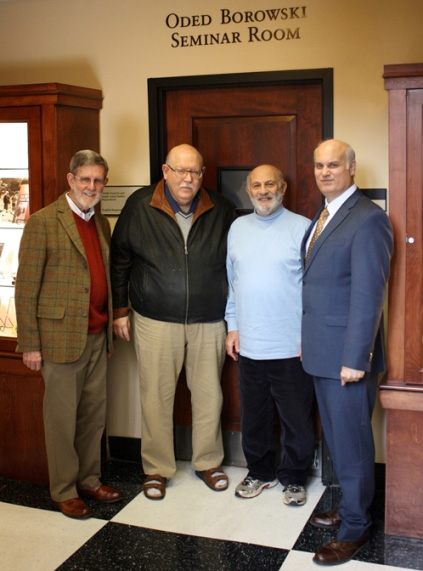History of MESAS Department
Oded Borowski arrived at Emory University in 1977 to establish the Hebrew program. Housed first in the Department of Spanish, Hebrew later merged with other language programs to create the Department of Modern Languages and Classics. With the addition of Mahmoud Al-Batal in Arabic and then Ken Frieden in Jewish Languages and Literatures, the Division of Arabic, Hebrew, and Judaic Languages and Literatures was formed.
In 1988, the Department of Modern Languages and Classics divided into separate departments along divisional lines. Professor Borowski now became Chair of the new Department of Near Eastern and Judaic Languages and Literatures. Enrollments in courses in Arabic and Hebrew languages and literatures and Middle Eastern culture and history grew through the energetic efforts of the Department's faculty, who offered overload courses on a regular basis to meet student demand. As a result, the number of faculty increased; Benjamin Hary and Devin Stewart joined the Department at this time.
In 1992, as a result of a national search, the Department hired Gordon Newby to be the new Chair, and added additional tenure-track lines, including Kristen Brustad in Arabic. With growing student demand for Persian language courses, the Department hired Frank Lewis in 1995. In 1996, the Department changed its name to Middle Eastern Studies. It continued to grow with the addition of new faculty, including Shalom Goldman in Middle Eastern Studies and Hebrew and Judaic literature.
In 2000, the United States Department of Education designated the Department a Title VI Undergraduate National Resource Center for the Middle East. With the Title VI grant, the Department expanded its offerings in Arabic, Hebrew and Persian languages. In 2001, South Asian Studies merged with Middle Eastern Studies to form the Department of Middle Eastern and South Asian Studies (MESAS). The merger added Hindi and Sanksrit to the Department roster of languages taught. In 2003, MESAS joined with the Middle East Center for Peace, Culture and Development at Georgia State University to form the Georgia Middle East Studies Consortium, a Title VI Undergraduate Resource Center serving the South Eastern Region.
During its 40 year history, MESAS has continued to add faculty and expand its programs.At present, more than 20 faculty offer a variety of courses in Middle Eastern and South Asian Studies, including language instruction in Arabic, Hebrew, Hindi, Persian and Tibetan.
